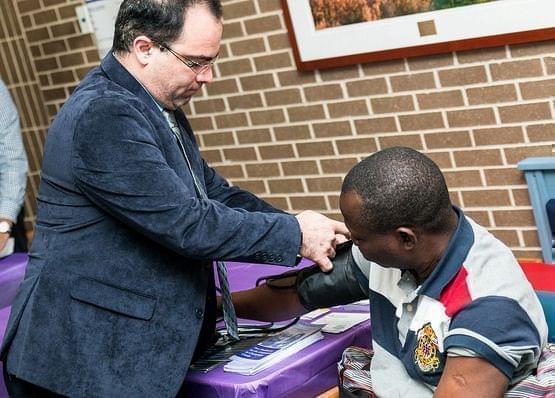Avicenna Free Clinic Focuses On Healthy Living

A community member gets his blood pressure screened for hypertension by a volunteer at Avicenna Community Health Center’s 2015 open house in August, which was coordinated by clinic manager Katherine Magerko and the Illinois association of free and charitable clinics. Avicenna is one of four free clinics in the Champaign-Urbana area. Avicenna Community Health Center
Free and charitable clinics continue to play a vital role in Champaign County, where more than 12,500 people are without health insurance. Avicenna is one of four free clinics in Champaign-Urbana. By coupling traditional medicine with lifestyle management, their health care team aims to do more than just treat illnesses as they arise.
Every Sunday from 1 to 4 pm, roughly a dozen patients come through Avicenna’s doors. The clinic manager, Katherine Magerko, says the Affordable Care Act has helped increase access to medical services, but it certainly did not get everybody insured. According to Magerko, free and charitable clinics across the country have seen the same number or an increase in the number of patients.
Avicenna’s patients include immigrants, many of whom do not qualify for insurance through ObamaCare. They also see people who are homeless, or lack insurance for other reasons.
Sue Scorggins is a Rantoul resident. On a Sunday afternoon last fall, Sue brought her 81-year-old mother in to Avicenna for a checkup.
‘’With the new ObamaCare, there are a lot of people that can’t today afford the health care that’s supposed to be affordable,” Sue says. “Her visits at Christie Clinic or at Carle are like $200 every time we take her there.” That’s a price tag she says they simply can’t afford.
At Avicenna, Dr. Mehmood Rasheed says they manage chronic conditions in a traditional way with medication, but they also focus on lifestyle modification.
‘’We have a nutritionist, a pharmacist and a social worker in our team, besides the doctors and nurse practitioners,” Dr. Rasheed says. They work together to help patients “so they can manage their life and health the way it should be managed, rather than just popping the pills.’’
Maintaining a healthy lifestyle is as important as treating health problems, according to Hani Youssef, the Director of Life Style Management and Nutrition Services at Avicenna. Youssef recalls a patient he used to have who had high blood sugar, was drinking three bottles of Coke every day, and was not getting enough sleep or working out. Once the patient made a few lifestyle changes, his condition improved and he was able to go from a very high dose of diabetes medication to a low dose.
Dr. Nathan Walker, the Director of Transformations, Christie Clinic’s medical weight loss program, agrees that lifestyle modifications can help turn back the clock on patients with diseases like diabetes.
“If you lost 20 pounds, for instance, you may not have diabetes anymore,” Dr. Walker says. “But, it's a lot more labor-intense way of approaching medicine as well.”
Since the clinic opened in 2010, Avicenna has scheduled more than 2,500 patient visits. Magerko says they aim to provide treatments before a patient’s condition worsens. She says that “not having health insurance means that you have to wait until the last minute, until things are absolutely dire, before you seek medical attention, and at that point it’s a lot harder to help people recover. So it’s really important for free and charitable clinics and for the society as a whole to take care of people before these things get to such an extreme situation.’’
The team of volunteers and staff at Avicenna makes it possible for people like Sue’s mother to come in and receive medical attention. Sue says she’s relieved to know that her mother can be treated free of charge, because they couldn’t afford her health needs if they didn’t have a free clinic like Avicenna. But she worries about those who do not have a place to go.
“I feel like we probably need more facilities,” Sue says. “I’m sure I am not the only that feels that way.”
Christine Herman contributed reporting. Khaoula Dellahi is a journalism graduate student at the University of Illinois. This story is the result of an ongoing collaboration between WILL and journalism faculty at the U of I College of Media.

